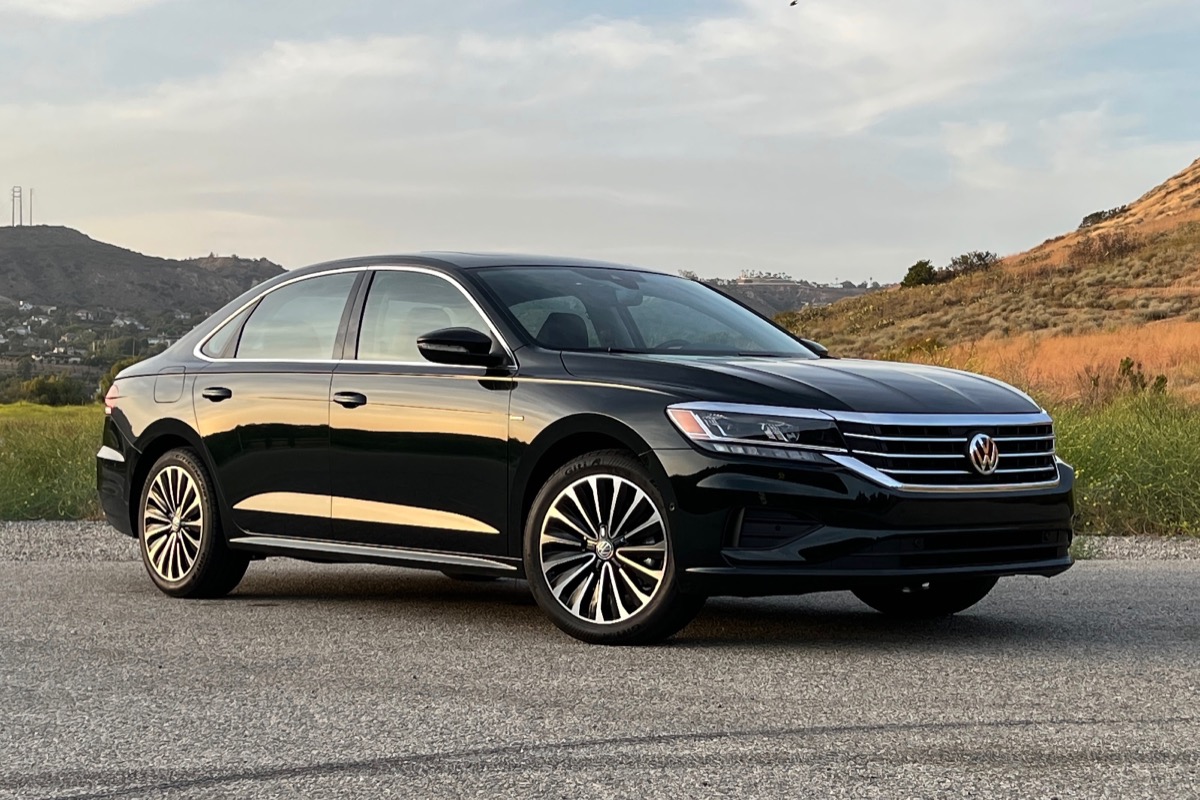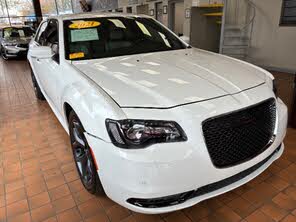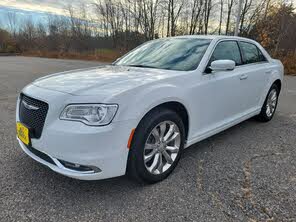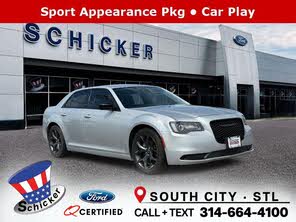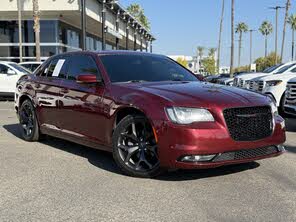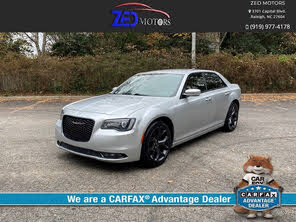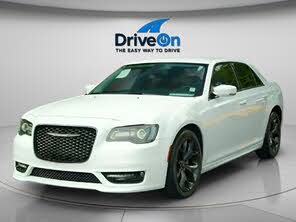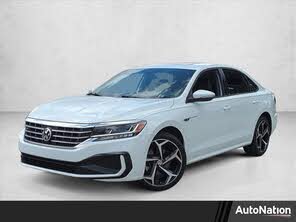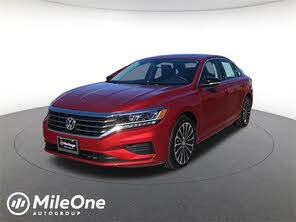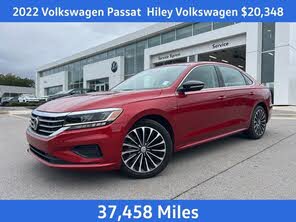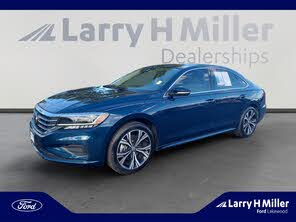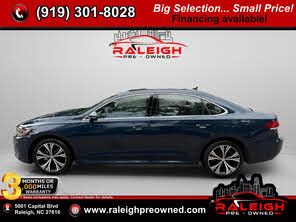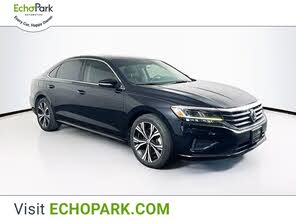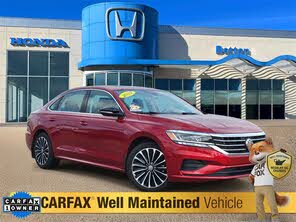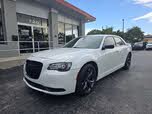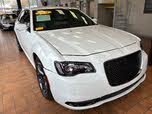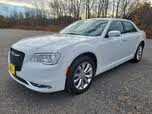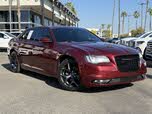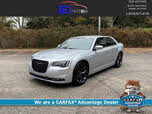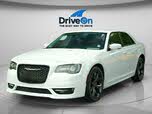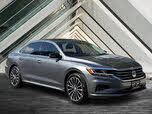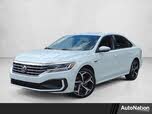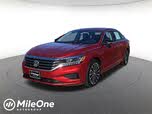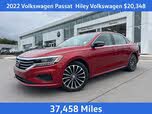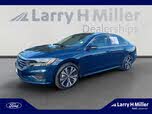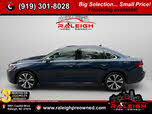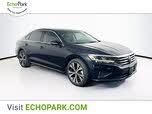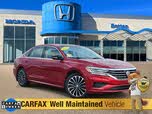2021 Chrysler 300 vs 2022 Volkswagen Passat
Overview | |
MSRP$31,875 | MSRP$27,575 |
Listings251 | Listings217 |
Ratings & Reviews | |
User Reviews | User Reviews |
Expert reviews7.7 out of 10 | Expert reviews6.0 out of 10 |
Pros
Cons
| Pros
Cons
|
2021 Chrysler 300 Reviews SummaryYou might think the 2021 Chrysler 300 is getting long in the tooth. And you’d be right. This car is so old that it's been through three different car companies (if you count the first generation). But like an aging starting catcher who has watched three different managers come and go, the Chrysler 300 still delivers on a daily basis. It provides North American consumers with a proper front-engine, rear-wheel drive (RWD) luxury sedan at a reasonable price. No other American manufacturer offers that, and you’d be hard-pressed to find anything that competes with it from Europe, Japan or Korea. Starting at just $31,000 MSRP, and offering options for all-wheel drive (AWD) or a 5.7-liter Hemi V8 engine, it’s no wonder that an average of 43,000 new car buyers a year have found the 300 so appealing since the second generation arrived for the 2011 model year. | |
2022 Volkswagen Passat Reviews SummaryFirst came the Dasher in 1974, then the Quantum in 1982, then the Passat in 1990. None became household names like the Honda Accord or Toyota Camry, partly because the Passat and its progenitors appealed to a small contingent of Americans seeking European design, engineering, and driving dynamics in a car often characterized as a bargain-priced Audi. But in the midsize sedan segment, a reputation for reliability and efficiency, not design or handling, is king. Tired of compromise, Volkswagen "Americanized" the Passat for the 2011 model year, moving production to a new factory in Chattanooga, Tennessee. The car's blandly attractive design, huge interior, big trunk, and soft ride seemed to be just what U.S. customers wanted, along with a ”Made in the USA” label. But those potential buyers had moved on to SUVs, and the new Passat alienated some of the VW faithful. The Dieselgate scandal didn't help the Passat, either. VW nailed the car's coffin shut when the family car segment began to wither rapidly. So now, the Passat departs the U.S. market, effectively replaced by the Tiguan and Atlas SUVs and leaving the Jetta to serve people who still want a sedan wearing a VW logo on its grille. | |
No video found | No video found |
Popular Features & Specs | |
Engine3.6L 292 hp V6 | Engine2.0L 174 hp I4 |
Drive TrainRWD | Drive TrainFWD |
Seating Capacity5 | Seating Capacity5 |
Horsepower292 hp @ 6350 rpm | Horsepower174 hp @ 5200 rpm |
MPG City19 | MPG City24 |
MPG Highway30 | MPG Highway36 |
Engine | |
Engine Name3.6L 292 hp V6 | Engine Name2.0L 174 hp I4 |
Torque260 lb-ft @ 4800 rpm | Torque206 lb-ft @ 1700 rpm |
Horsepower292 hp @ 6350 rpm | Horsepower174 hp @ 5200 rpm |
DrivetrainRWD | DrivetrainFWD |
Fuel Economy | |
MPG City19 | MPG City24 |
MPG Highway30 | MPG Highway36 |
Interior | |
Seating Capacity5 | Seating Capacity5 |
Key Features | |
Sunroof/Moonroof | Sunroof/MoonroofStandard |
Safety | |
Front Crash Overall4 | Front Crash Overall3 |
Side Crash Overall5 | Side Crash Overall5 |
Dimensions & Capacity | |
Cargo Space16.3 cu ft | Cargo Space15.9 cu ft |
Curb Weight4013 lbs | Curb Weight3369 lbs |
Height58.5 in | Height58.7 in |
Length198.6 in | Length193.6 in |
Width75.0 in | Width72.6 in |
Wheelbase120.0 in | Wheelbase110.4 in |
Maximum Payload1087 lbs | Maximum Payload937 lbs |
Number of doors4 | Number of doors4 |
Maximum Towing Capacity1000 lbs | Maximum Towing Capacity |
Overview | ||
MSRP | $31,875 | $27,575 |
Listings | ||
Ratings & Reviews | ||
User reviews | ||
Expert reviews | 7.7 out of 10Read full review | 6.0 out of 10Read full review |
Pros & cons | Pros
Cons
| Pros
Cons
|
Summary | You might think the 2021 Chrysler 300 is getting long in the tooth. And you’d be right. This car is so old that it's been through three different car companies (if you count the first generation). But like an aging starting catcher who has watched three different managers come and go, the Chrysler 300 still delivers on a daily basis. It provides North American consumers with a proper front-engine, rear-wheel drive (RWD) luxury sedan at a reasonable price. No other American manufacturer offers that, and you’d be hard-pressed to find anything that competes with it from Europe, Japan or Korea. Starting at just $31,000 MSRP, and offering options for all-wheel drive (AWD) or a 5.7-liter Hemi V8 engine, it’s no wonder that an average of 43,000 new car buyers a year have found the 300 so appealing since the second generation arrived for the 2011 model year. | First came the Dasher in 1974, then the Quantum in 1982, then the Passat in 1990. None became household names like the Honda Accord or Toyota Camry, partly because the Passat and its progenitors appealed to a small contingent of Americans seeking European design, engineering, and driving dynamics in a car often characterized as a bargain-priced Audi. But in the midsize sedan segment, a reputation for reliability and efficiency, not design or handling, is king. Tired of compromise, Volkswagen "Americanized" the Passat for the 2011 model year, moving production to a new factory in Chattanooga, Tennessee. The car's blandly attractive design, huge interior, big trunk, and soft ride seemed to be just what U.S. customers wanted, along with a ”Made in the USA” label. But those potential buyers had moved on to SUVs, and the new Passat alienated some of the VW faithful. The Dieselgate scandal didn't help the Passat, either. VW nailed the car's coffin shut when the family car segment began to wither rapidly. So now, the Passat departs the U.S. market, effectively replaced by the Tiguan and Atlas SUVs and leaving the Jetta to serve people who still want a sedan wearing a VW logo on its grille. |
Video | No video found | No video found |
Popular Features & Specs | ||
Engine | 3.6L 292 hp V6 | 2.0L 174 hp I4 |
Drive Train | RWD | FWD |
Seating Capacity | 5 | 5 |
Horsepower | 292 hp @ 6350 rpm | 174 hp @ 5200 rpm |
MPG City | 19 | 24 |
MPG Highway | 30 | 36 |
Engine | ||
Engine Name | 3.6L 292 hp V6 | 2.0L 174 hp I4 |
Torque | 260 lb-ft @ 4800 rpm | 206 lb-ft @ 1700 rpm |
Horsepower | 292 hp @ 6350 rpm | 174 hp @ 5200 rpm |
Drivetrain | RWD | FWD |
Fuel Economy | ||
MPG City | 19 | 24 |
MPG Highway | 30 | 36 |
Interior | ||
Seating Capacity | 5 | 5 |
Key Features | ||
Sunroof/Moonroof | Standard | |
Safety | ||
Front Crash Overall | 4 | 3 |
Side Crash Overall | 5 | 5 |
Dimensions & Capacity | ||
Cargo Space | 16.3 cu ft | 15.9 cu ft |
Curb Weight | 4013 lbs | 3369 lbs |
Height | 58.5 in | 58.7 in |
Length | 198.6 in | 193.6 in |
Width | 75.0 in | 72.6 in |
Wheelbase | 120.0 in | 110.4 in |
Maximum Payload | 1087 lbs | 937 lbs |
Number of doors | 4 | 4 |
Maximum Towing Capacity | 1000 lbs | |
The 2021 Chrysler 300 retained much of its classic design, reminiscent of its major facelift in 2014. Its old-school "three-box design" gave it a straightforward profile, easily recognizable and timeless. The car's appearance, from the base 300 trim to the high-end 300S, exuded a sense of pride and elegance, making it a standout at any valet. The grille and headlights had evolved over the years, with the 2021 model featuring bi-xenon halogen projector lamps and LED driving lamps on lower trims, while higher trims like the Touring L and 300S boasted adaptive HID lamps. The wheel options ranged from 17-inch silver alloys to 20-inch Black Noise wheels, adding to its robust and no-nonsense look.
In contrast, the 2022 Volkswagen Passat, particularly the Limited Edition, marked the end of an era with a special commemorative model. Priced at $31,570, only 1,973 units were produced, featuring exclusive 18-inch alloy wheels, black mirror caps, and special badges. The Limited Edition was available in unique Racing Green paint, among other colors. Inside, the Passat showcased Mauro Brown leather upholstery, fake wood trim, and special seat tags, creating an upscale ambiance. Despite its decade-old design, the Passat's interior remained elegant, though it mixed high-quality materials with some outdated technologies, like the 6.3-inch touchscreen infotainment system.
















The 2021 Chrysler 300 offered a range of engine options, starting with a 3.6-liter Pentastar V6 engine that delivered 292 horsepower and 260 pound-feet of torque in the 300 Touring and 300 Touring L trims. The 300S trim upped the ante with 300 horsepower and 264 pound-feet of torque. For those seeking more power, the 300S also offered a 5.7-liter V8 engine with 363 horsepower and 394 pound-feet of torque, the only V8 in its class. Both engines were paired with an eight-speed automatic transmission, with paddle shifters available on the 300S. Rear-wheel drive was standard, while all-wheel drive was a $2,750 option, though not available on the 300S. The driving experience ranged from a quiet and comfortable ride in the base trim to a more traditional luxury feel in the AWD Touring L, with the V8 providing a fun, albeit less powerful, experience compared to its Dodge Charger sibling.
The 2022 Volkswagen Passat, on the other hand, featured a 2.0-liter turbocharged four-cylinder engine producing 174 horsepower and 206 pound-feet of torque. This engine, paired with a six-speed automatic transmission, powered the front wheels. While the Passat's engine provided adequate power for daily driving, it lacked the immediate power needed for quick passing or rapid acceleration. The transmission's Sport mode offered a slight improvement in responsiveness without significantly impacting fuel efficiency, as evidenced by the observed 30.7 mpg during testing. The Passat's ride quality prioritized comfort, though it could feel jittery on city streets and transmitted impacts through its older vehicle architecture. Despite these drawbacks, the Passat exhibited traditional German handling traits on twisty roads, providing a surprisingly enjoyable driving experience.
The 2021 Chrysler 300 excelled in providing generous interior space, with 41.8 inches of front legroom and 40.1 inches in the rear, surpassing competitors like the Lexus ES350 and Toyota Avalon. With 106.3 cubic feet of passenger volume, the 300 offered a spacious cabin, though it remained classified as a midsize car by the EPA. The trunk provided 16.3 cubic feet of cargo space, sufficient for four large suitcases, making it a practical choice for those needing ample storage.
The 2022 Volkswagen Passat was known for its spacious cabin, comfortably accommodating five adults. The front seats offered eight-way power adjustment, though the inability to adjust the bottom cushion angle separately was a drawback. The rear seats, however, provided exceptional comfort with ample legroom, air conditioning vents, USB ports, and coat hooks. The Passat's 15.9 cubic feet of trunk space was competitive, though it lacked underfloor trays or side bins for additional storage. The remote keyless entry fob allowed for easy trunk access, enhancing its practicality.
The 2021 Chrysler 300 featured the Uconnect 4C infotainment system with an 8.4-inch touchscreen, praised for its intuitive interface and functionality. Standard features included Apple CarPlay and Android Auto, with the option to upgrade to the Popular Equipment Group for $3,495, adding a 506-watt amp, nine premium Alpine speakers, GPS navigation, SiriusXM Traffic Plus, surround sound, a trunk-mounted subwoofer, and a dual-pane sunroof.
The 2022 Volkswagen Passat's infotainment system, while not as advanced as other VW models, included standard App-Connect smartphone connectivity, SiriusXM satellite radio, and Bluetooth support for two devices. The R-Line and Limited Edition trims added HD Radio, a navigation system with voice recognition, and a Fender premium audio system, known for its clarity and range. Despite its smaller 6.3-inch screen, the Passat's infotainment system provided essential connectivity and entertainment features.
The 2021 Chrysler 300 received mixed safety ratings, with top "Good" scores in most IIHS crash tests but a "Marginal" score in small overlap tests and a "Poor" rating for headlights. The NHTSA awarded it a four-star overall rating, with five stars for the combined side barrier and side pole crash test. Standard safety features included active head restraints, multiple airbags, traction and stability control, brake assist, rain brake support, ready alert braking, and hill start assist. Advanced safety features were available through higher trims and packages, such as the $2,395 SafetyTec Plus Group, which added forward collision warning, automatic emergency braking, adaptive cruise control, automatic high beams, lane departure warning, and rain-sensing wipers.
The 2022 Volkswagen Passat, while lacking the latest IQ Drive technology, offered a comprehensive suite of standard safety features, including forward-collision warning with pedestrian detection, automatic emergency braking, blind-spot monitoring, rear cross-traffic alert, automatic rear braking, lane-departure warning, lane-keeping assistance, and adaptive cruise control. The R-Line trim added automatic high-beam headlights, while the Limited Edition included adaptive headlights, front and rear parking sensors, and a park-assist system. The IIHS awarded the Passat "Good" ratings in all crash tests and for its top-trim headlights, while the NHTSA gave it a four-star overall rating, with a three-star rating for frontal-impact collision protection.
CarGurus highlights
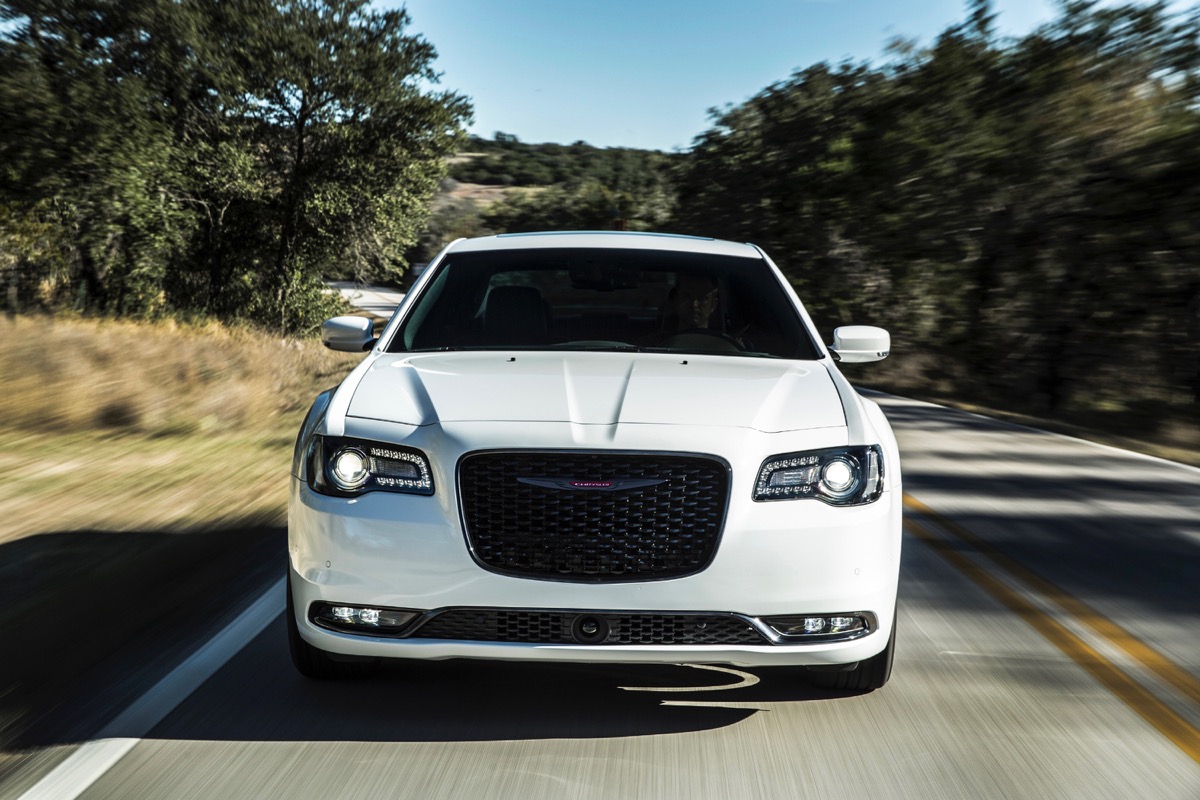
According to CarGurus experts, the overall rating for the 2021 Chrysler 300 is 7.7 out of 10, while the 2022 Volkswagen Passat scores 6.0 out of 10. Based on these ratings, the 2021 Chrysler 300 is the recommended choice, offering a more powerful engine lineup, a spacious and luxurious interior, and a superior infotainment system.
Choose the 2021 Chrysler 300 if:
- You prioritize a powerful engine with V8 options.
- You need a spacious interior with ample legroom and cargo space.
- You value an intuitive and feature-rich infotainment system.
Choose the 2022 Volkswagen Passat if:
- You seek a spacious cabin with exceptional rear-seat comfort.
- You prefer a car with comprehensive standard safety features.
- You appreciate traditional German handling traits and a comfortable ride.
CarGurus highlights

According to CarGurus experts, the overall rating for the 2021 Chrysler 300 is 7.7 out of 10, while the 2022 Volkswagen Passat scores 6.0 out of 10. Based on these ratings, the 2021 Chrysler 300 is the recommended choice, offering a more powerful engine lineup, a spacious and luxurious interior, and a superior infotainment system.
Choose the 2021 Chrysler 300 if:
Shop Now- You prioritize a powerful engine with V8 options.
- You need a spacious interior with ample legroom and cargo space.
- You value an intuitive and feature-rich infotainment system.
Choose the 2022 Volkswagen Passat if:
Shop Now- You seek a spacious cabin with exceptional rear-seat comfort.
- You prefer a car with comprehensive standard safety features.
- You appreciate traditional German handling traits and a comfortable ride.

By: CarGurus + AI
At CarGurus, our team of experienced automotive writers remain at the heart of our content operation, conducting hands-on car tests and writing insightful guides that are backed by years of industry experience. To complement this, we are harnessing AI to make our content offering more diverse and more helpful to shoppers than ever. To achieve this, our AI systems are based exclusively on CarGurus content, ratings and data, so that what we produce is both unique to CarGurus, and uniquely helpful to car shoppers.
